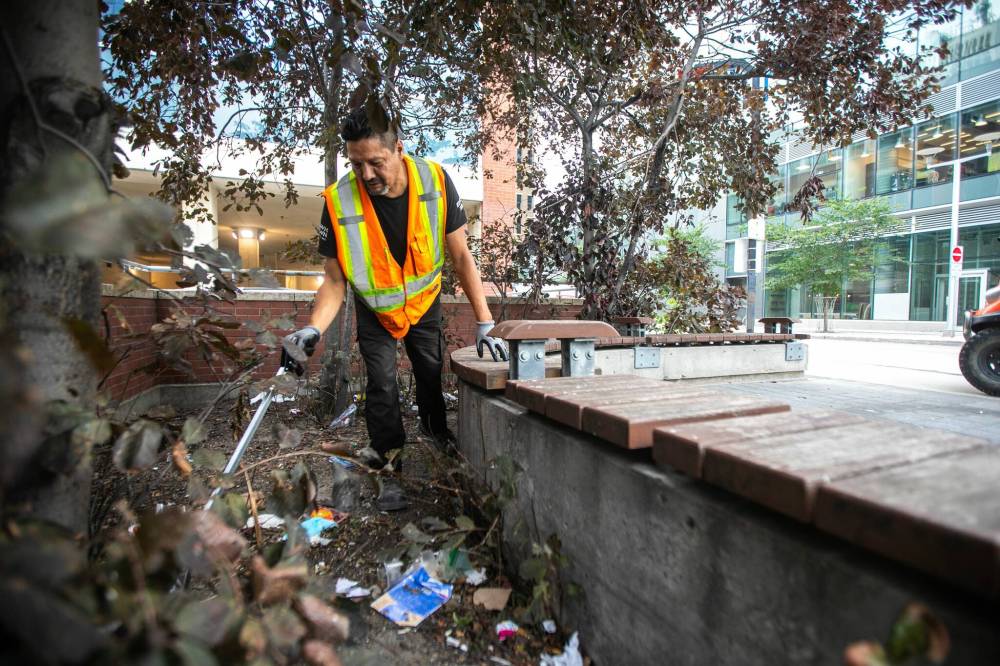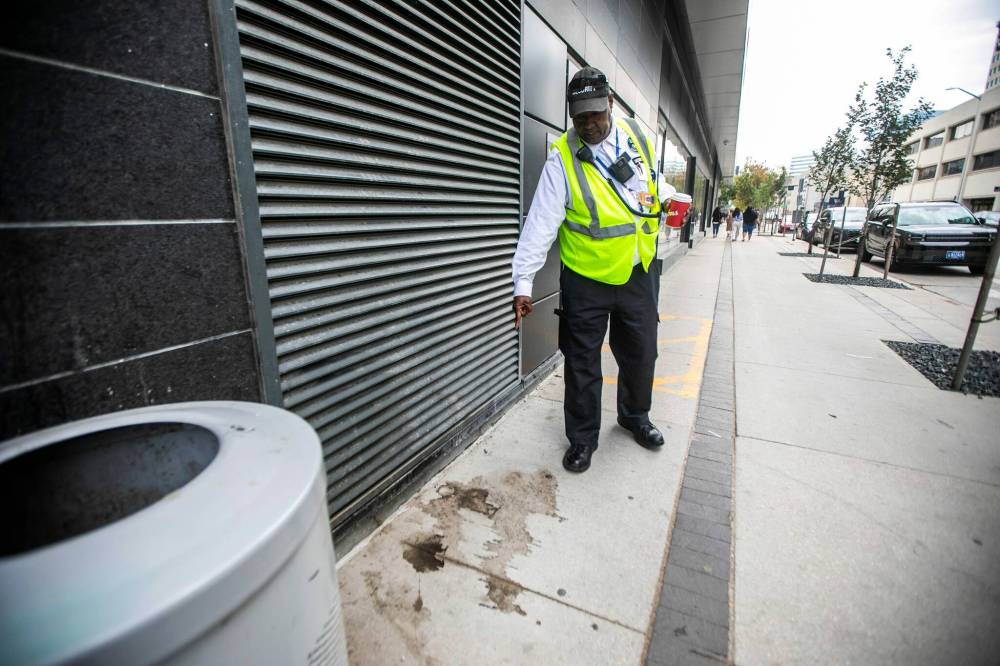Abdi Nooh could conduct a tour of the spots where trash and hazardous waste are dumped on downtown sidewalks.
On Wednesday morning, the Manitoba Hydro security guard rattles a broken garbage and recycling bin on Portage Avenue that he says is cracked open daily by people who sift through the garbage and dump much of it on the ground.
Turning down Carlton Street, he points out a window recently replaced after a brick was thrown through it, and stains from human waste and vomit on the sidewalk that had been power-washed away.

MIKAELA MACKENZIE / FREE PRESS
Downtown Winnipeg BIZ Enviro Team member Jeremy Roulette cleans trash from behind the bench at Carlton Street and Graham Avenue Wednesday.
“It’s too much, too much, too much. Every day you see, too much garbage… cigarettes, everything, sometimes needles,” he said from his post outside the Portage Avenue Hydro building.
He sees cleanup crews from the city’s public works department and Downtown Winnipeg BIZ working around the clock nearly every day.
He said they can’t keep up with the mess. He’s tried to step in and stop people from littering, but said it isn’t safe because many people get aggressive.
“It’s life, that’s it. What can you do?” he said.
People who work and live downtown told the Free Press they share Nooh’s concerns. The near-constant presence of community cleanup staff never seems to be enough.
“There is a lot of garbage, a lot of urine, feces, throw-up, drug paraphernalia… (cleaning staff) just can’t keep up,” said a woman who works downtown but declined to give her name.
The amount of trash dumped downtown spiked at the end of the COVID-19 pandemic, the woman said. As socioeconomic struggles related to homelessness, housing and safety were exacerbated, the trash began to pile up.
“I feel like the root is more than garbage and drugs and people on the street,” she said.
Downtown Winnipeg BIZ’s cleaning and maintenance team hits the streets from 6:30 a.m. to 6 p.m. weekdays and 8 a.m. to 4 p.m. on weekends, while the city collects garbage and recycling nightly in an area bordered by Memorial Boulevard, Broadway, Ellice Avenue and Main Street up to Higgins Avenue.
Downtown Winnipeg BIZ CEO Kate Fenske said the $1 million it invests annually into cleanup is the organization’s largest program investment.

MIKAELA MACKENZIE / WINNIPEG FREE PRESS
“It’s too much, too much, too much. Every day you see, too much garbage… cigarettes, everything, sometimes needles,” Abdi Nooh, a security guard at the Portage Avenue Manitoba Hydro building.
“This summer alone, staff have cleaned nearly 3,000 bus shacks, safely disposed 2,737 needles, picked up nearly 468,500 litres of litter, removed 5,650 kilograms of bulk waste, 2,355 biohazards and 6,108 graffiti tags,” she wrote in an email Wednesday.
Cindy Gilroy, councillor for the Daniel MacIntyre ward, was in meetings all day Wednesday with community members and business owners.
“They all had the same thing to say — garbage, garbage, garbage,” she said.
While downtown cleaning crews have ramped up their work, the residential neighbourhoods surrounding the core remain neglected, she said.
“We’re starting to feel a lot of that garbage filtered into our neighbourhoods,” she said.
She’d like the city to revamp how it gets involved in cleanups in inner-city neighbourhoods. She said council has responded slowly to efforts to change policies. Earlier this year, Gilroy pushed for a motion in which needles, weapons and other garbage in parks, playgrounds and tot lots in “higher needs” areas in Winnipeg would take priority.
Instead, city council’s community services committee approved a motion in March asking the public service to look into options for cleaning up parks and provide a cost estimate. It asked for a report back in about six months.
A community services meeting scheduled for Sept. 10 includes a request from the public service to extend that deadline by 60 days owing to “timeline constraints.”
Gilroy said some city staff were asked to focus on parks this summer, but she worries that when winter arrives and the number of staff declines, parks will be neglected.
There are easy, affordable ways to improve garbage collection in the inner-city, Gilroy said, and there could be more funding for community clubs and organizations that focus on garbage pickup.

MIKAELA MACKENZIE / WINNIPEG FREE PRESS
Abdi Nooh points out urine marks on the sidewalk near the Manitoba Hydro building.
She said political will is lacking.
“It’s so complex, when we’re talking about homelessness, mental health and addictions… but what isn’t really complex is the garbage, but we can’t really manage finding a solution for that,” she said.
Tom Ethans, executive director of Take Pride Winnipeg, said the level of trash downtown is slightly higher than usual right now, as many of its summer volunteers are students who are heading back to school.
He asked that anyone interested in hosting a community cleanup contact Take Pride.
“We do have groups going out in September to do cleanups, so that will be good, but we need help,” he said. “We need people to be more aware of what’s out there and to stop littering.”
malak.abas@freepress.mb.ca

Malak Abas
Reporter
Malak Abas is a city reporter at the Free Press. Born and raised in Winnipeg’s North End, she led the campus paper at the University of Manitoba before joining the Free Press in 2020. Read more about Malak.
Every piece of reporting Malak produces is reviewed by an editing team before it is posted online or published in print — part of the Free Press‘s tradition, since 1872, of producing reliable independent journalism. Read more about Free Press’s history and mandate, and learn how our newsroom operates.
Our newsroom depends on a growing audience of readers to power our journalism. If you are not a paid reader, please consider becoming a subscriber.
Our newsroom depends on its audience of readers to power our journalism. Thank you for your support.